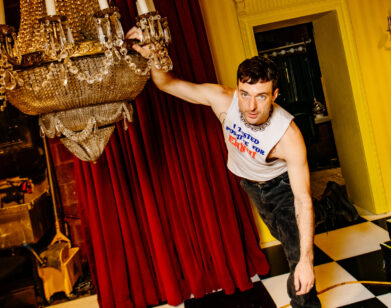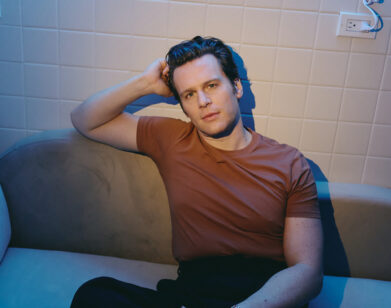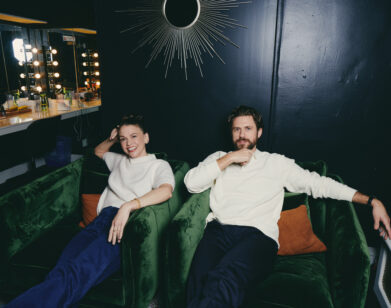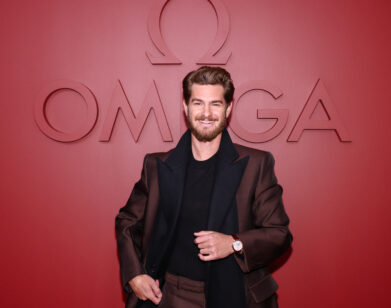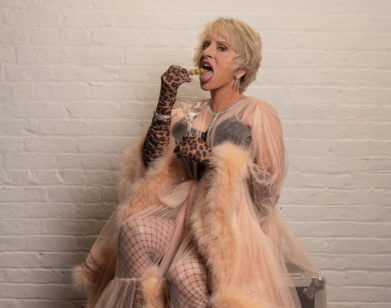Love is Company: Director Marianne Elliott on Her Revival of Sondheim’s Classic Musical
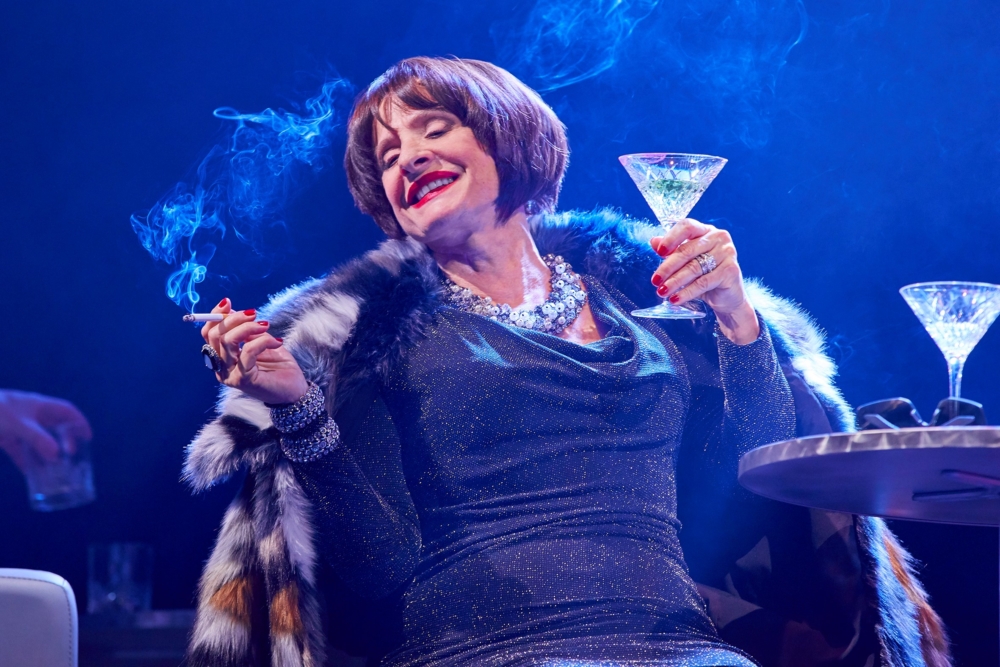
Patti LuPone in Company.
“You know what the pulse of this city is?” asks Marta, one of three girlfriends of the lead lothario of the 1970 musical Company by George Furth and Stephen Sondheim, who celebrates his 90th birthday today. She looks at him expectantly. He responds, deadpan and earnest, “A busy signal.” Once a quasi-avant-garde Broadway musical about modern metropolitan alienation, Company now has more to face than just a busy signal.
The musical, which revolves around the 35-year-old perpetually single Bobby, who lives vicariously though his friends in various states of coupledom, contains a web of complicated sexual politics. But with Company‘s Broadway revival—lifted from director Marianne Elliott’s West End, gender-swapped reimagining of the musical in 2018—we, the audience, along with Bobbie, are still trying to figure out what it means to “want something” and “want something.” In January, just a week or so into rehearsals, I spoke with Elliott about why Company, why it still matters, and how it’s her love letter to New York.
———
KYLE TURNER: Tell me about the first time you encountered Company.
MARIANNE ELLIOTT: I knew the musical as a kid really because I had these two uncles in my life—I called them uncles but they weren’t really. They were just a gay couple that knew my mom really well and I used to spend a lot of time at their house. They had lots of showtunes always on the record player and they were always playing musicals, but they loved Sondheim, so I kind’ve got to know Sondheim by osmosis. I didn’t even think about it like, “What’s that? Who is that?” I just knew the numbers. And I wanted to do Company for a long time, ever since I first started directing.
TURNER: How did your relationship to the material change over time before you decided that you wanted to adapt it? Was there a particular scene or song that was key for making the whole thing work for you?
ELLIOTT: Well, it was a sort of long process, really. I had never seen it. I didn’t see the Donmar Warehouse version [directed by Sam Mendes in 1996], which was hugely successful in England. People talk about it a lot. In a way, I’m quite glad I didn’t because I didn’t have that definitive experience. Sometimes when you have a definitive experience you don’t want to touch it because you think, well that’s how it always should be. But I wanted to do Company, and my business partner Chris Harper said to me when we first set up our own theatre company, “We should do all the things that we wanted to do, and you’ve always wanted to do Company.”
So I looked at it and I thought it feels quite of it’s time now because it was so on the money about 1969-1970. And he said, “Well, why don’t you think about making it into a woman?” When I looked at it really closely, and read George Furth’s book, I thought, Actually, this could really work. It feels so relevant and contemporary to make it about a woman because a woman is still struggling with those issues in a way that only men were in 1969.
TURNER: You’re right in that certain aspects of the text do seem very much rooted in when it was originally written. What kind of discussions were you having with Chris Harper and your cast and crew as you were staging this in London in terms of talking about the gender and sexual politics?
ELLIOTT: I think it was like treating it as a new piece, really. We got hold of every single thing George Furth ever wrote, including all the different versions of Company, because we were trying to be so faithful to him. We would only ever change a line if it was from another George Furth version of Company or another George Furth play. So we did quite a lot of that work before we went into rehearsals and more of it now. When we were actually in rehearsals, nobody really questioned it; it was just taken as given that it was gonna be [a new piece] now, it was taken as given that it was gonna be a woman.
TURNER: Could you talk about how some of the characters switch their dialogue, like Susan and Peter, and Jenny and David?
ELLIOTT: Well, in the original, as you know, all the men are probably working and they’re all a little bit sanguine about marriage, and they’re all quite wise. And all the women seem to not be working and they all seem to be a little bit kooky and they all seem to be into the idea of being married. That doesn’t feel very contemporary. So we literally just switch some of the lines around in two of the couples so that you have a stay-at-home dad in one couple, and in another couple you have a dad who’s a little bit neurotic and scared of heights, and where the women are clearly the breadwinners. Plus, we’ve made the casting more diverse than what it would’ve been at the time. And then when we were auditioning for Amy, it just didn’t feel quite right, Amy being Amy.
TURNER: Yeah, Amy comes off as sort’ve this … drag persona of a woman. It seems very gendered in her, the way she’s described as having a sort of, quote-unquote “hysteria.”
ELLIOTT: Right! Exactly. It just felt, again, of its time, and I just suddenly had the thought, we were like, gasp, “What if it was a man!? What if it was a gay man singing this?” And we were like, “No, it can’t work, it can’t work, it can’t work, ‘cause she’s got lines like, ‘People will think I’m pregnant.’ No, it can’t work, it was not written that way.” But I asked a friend of mine, Johnny Bailey, “Can you come in tomorrow and just give this a go? And we won’t tell anybody anything.” And he came in and it just released it. It was just like, “Oh, yes!” Because, of course the group of people who are questioning whether they should be married or not are gay people, you know? And so it felt really, again, relevant. It just was very liberating. I sent an email to Stephen Sondheim that night saying, “Can you just sit down? Get a glass of wine before you read this, it’s not what you want to hear, but this is what we tried today and it was so liberating.” And I sent him the video and he emailed back overnight saying, “Just sit down, get a glass of wine, this is not what you’re expecting to hear. I love the idea, I don’t need to look at the video. Go for it.”
TURNER: That scene in particular had a lot of resonance for me when I was watching it. I definitely wept. There’s a sense of compounded anxiety, like, as a queer person, if you are getting married, what are you losing of your queerness? Are you kind of buying into a certain institution that is responsible for a lot of marginalization? That internal debate going through “Jamie’s” head I thought was really beautifully articulated. And I was wondering, what has it been like finding new meanings in the text by going through this process?
ELLIOTT: I suppose it’s been fantastic; it’s just a testament to how brilliant the writing is. Because the scenes are, on first view, quite tricky; they’re complex, but they’re very human. Therefore, you can do anything with the scenes because they’re so well-absorbed. But also it’s been liberating in a way because, in how many shows do you see that it’s about a woman getting older? She feels like she’s getting older and her body clock is ticking. How many shows do you see where there’s an older woman, Joanne, who feels threatened because she’s getting so old? She feels like she’s losing her commodity in her world and also her husband, and she worries that he’s gonna have an affair and she tries to control that. So it became gratifying and liberating to do it this way because it felt like we were throwing new light on these issues, as well as new light on the material.
TURNER: There’s also this kind of memory play, Alice in Wonderland aspect to it.
ELLIOTT: [The set designer] Bunny Christie and I did months of work on the design and we went through all sorts of journeys with it. In fact, we even designed a completely different set and, until the 11th hour we thought, “No, it’s got to be better than that.” But what we always had as a kind of template was the idea that the whole thing happens in Bobbie’s head, like memories; the idea of her going through a door, from one memory to another, is just a chain of thinking. Whereas, in reality, she’s probably hiding under the stairs, waiting for the surprise party to begin. So when we realized that, we realized that certain thoughts probably meant that she sort of fell down the rabbit hole. It’s like we’re coming back full circle at the end of the first act, starting there at the beginning of the second act, ending there again at the end of the second act.
TURNER: You’re bringing it to New York! It’s a very New York musical and you’re working with a new cast of actors. How is New York going to impact this production?
ELLIOTT: It’s been a fascinating journey for me, because we will have had six weeks to rehearse it and we’re rehearsing from scratch. All of the actors apart from Patti [LuPone] are new, and they’re gonna bring their own new and different interpretation to it; what it means for them to be New Yorkers, and analyzing the text as modern New Yorkers.
TURNER: What I love about Company is that New York shapes the way characters relate to one another spatially, intellectually, and emotionally between one another. And, after Angels in America, this is your second New York text. Has being in the city shaped your directing at all?
ELLIOTT: You know what, I think New York’s been a massive influence on my whole life, because I came here when I was 18 on my own and I just had a one ticket plane ride single to New York and one night in the YMCA and that was it. Honestly, it was the best time of my life. I stayed here for four months, and I just fell in love with it. I think I made a wish that I would come back and work here, and I’ve been so lucky because I have, with War Horse and Curious Incident and Angels in America and now this. I’m always absorbing it, like a sponge, and sometimes you don’t realize what your subconscious is doing. I mean, I probably didn’t realize that this was a kind of love story for New York, from my point of view, but it is! And I love New York and here I am in New York, doing a show on Broadway about a show that is about New York. What gets better than that?
TURNER: What bar do you think Bobbie would go to?
ELLIOTT: The thing is that New York is so diverse, isn’t it? That’s what I love about it. I love walking around the city. You go from one universe to another in the space of a few streets. We’ve decided that Bobbie has a really nice apartment in Tribeca because she’s very successful career woman; that’s why she’s at a crisis now, as to whether she should settle down, because what will that mean? How will that compromise the life that she’s built?
TURNER: Sondheim once described Company as “[dealing] with the increasing difficulty of making one-to-one relationships in an increasingly dehumanized society … it [takes] place in an urban society in which individuality and individual feeling become more and more difficult to maintain.” How do you think that’s changed?
ELLIOTT: The society has become more dehumanized, more isolated, more separated. But I think making it a woman is particularly interesting in my perspective because it’s all very well, but a woman is meant to have everything. A 35-year-old woman who’s got her whole life ahead of her, you think, is meant to have everything, she’s supposed to be successful, clever, to have her friends, have her amazing career, to be a mom, and to be a wife. How many things can you juggle? I think if you’d worked so hard to be able to have a great successful career, then you get to a point in your life where you think, “I’ve got about five years left now, if I want to do anything else. If I want to settle down, I’ve got to do something about it now.” But maybe you haven’t found the right person, and maybe they haven’t found you, and how are you supposed to do that? I think social media, and the ease of how to meet people—like Tinder, Grindr, Bumble—they actually seem to make it more isolating because there is so much choice that you become a disposable person. People don’t put as much energy in the person that they’re with or the person that they’re dating because there’s somebody around the corner. I think it’s more acute now.
TURNER: You said in the Evening Standard that the process of directing can be a really lonely experience. Do you see any parallels in terms of that loneliness in the show?
ELLIOTT: I think she is quite lonely. It’s quite a female syndrome that she’s in because she would never show it. But she does spend every scene serving other people. I mean, she’s constantly trying to please, facilitate, literally every scene. She doesn’t drive any scene. She’s reactive! And that is interesting for her because I’ve learned in the piece she’s like, “No! Hold on a minute, I’m gonna make a decision about my own life. About what I’m gonna blow out the candles and wish for, and when I do that, nobody is going to be around, not even the audience.” Because the minute she blows the candles out, we go to blackout. She makes a wish that is entirely her own, and it’s up to us what that decision is.
TURNER: There was a lot of Sondheim in pop culture last year; Marriage Story used a couple songs from Company. Why do you think that his music has so seeped into our consciousness?
ELLIOTT: I think, personally, because he writes psychologically. I mean, of course, he’s an amazing composer, he’s got incredible harmony and his songs are emotional, but they come from a psychological point of view and so therefore what happens in the songs is that the characters go on journeys, they’re not just songs. So you’re pulled with the story of what’s actually happening, psychologically and emotionally for the characters. I think that’s what possibly makes him the most amazing genius and the most long lasting genius because they mean something, they mean something at the beginning, they mean something in the middle which is different, and then they mean something at the end, which is different again.
TURNER: What have you learned about love and self-love working on Company?
ELLIOTT: That’s a great question. I think you’ve hit the nail on the head about what the piece means. It means love and company. What are those terms and how many permutations of those terms are there? She needs love in her life, but has she got enough love in her life at the moment? Does she have the right amount of love with her friends? Does she need more love? What does she need for her?
It’s full of love, the piece. And yet it’s also full of irony and complications of love and complications of being in a couple and the complications of being single. What have I learned about it? Shit … what have I learned? Just that it’s complicated, I suppose! It’s complex, it’s complicated and it’s juicy. There’s a lot to it. There are so many different ways of looking at love and being in love and expressing love.

